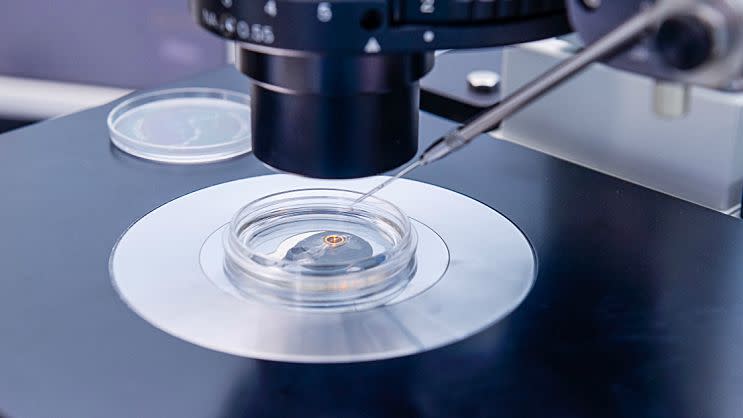Study Says the Number of Eggs In Your Ovaries Has Nothing to Do with Your Chances of Getting Pregnant

Fertility testing has been on the rise as more women try to have babies in their 30s and 40s when fertility starts to decline. One of the most widely used tests to gauge fertility involves getting your ovarian reserve measured, which determines how many eggs you have left.
Reminder: You're born with a set number of eggs that are released during your menstrual cycle every month. Determining the exact number of eggs in a woman's ovaries has been a key metric in determining reproductive capacity. More eggs, more chance of conceiving, right?
Not according to a new study published in the Journal of the American Medical Association (JAMA), which concluded that the number of eggs you have in your ovarian reserve cannot accurately determine your level of fertility. It's the quality of the eggs that really matters-and as of right now, there aren't many tests out there to determine that.
For the study, researchers determined the ovarian reserves of 750 women from ages 30 to 44 who had no history of infertility, then put them into two categories: those with a diminished ovarian reserve and those with a normal ovarian reserve.
When researchers followed up with the women a year later, they found that women with a diminished ovarian reserve were just as likely to get pregnant as women with a normal ovarian reserve. In other words, they found no correlation between the number of eggs in a woman's ovaries and her ability to get pregnant.
"Having a high egg count won't increase your chances of having fertile eggs," says Eldon Schriock, M.D., a board-certified obstetrician, gynecologist, and reproductive endocrinologist from Prelude Fertility.
The quality of an egg is determined by the probability of it becoming an embryo and implanting in the uterus, Dr. Schriock explains. Just because a woman has a regular period does not mean she has a high enough egg quality to result in a pregnancy.
It's also important to note that an egg with poor quality can get fertilized, but the woman does not typically carry the pregnancy to full term. This is because the egg might be unable to implant, and even if it does implant, it probably won't develop properly.
Problem is, the only way to test for egg quality is through in vitro fertilization (IVF). "By carefully examining the eggs and embryos, we can get clues about why pregnancy has not occurred previously," says Dr. Schriock. While some couples choose to go this route, most fertility experts believe that a woman's age is the most accurate predictor of how many quality eggs she's likely to have.
"When you're most fertile at age 25, maybe 1 in 3 eggs are high-quality," Dr. Schriock says. "But fertility falls by half by the time you're 38, leaving you with about a 15 percent chance of getting pregnant naturally every month. Half of all women run out of fertile eggs by the time they're 42, at which point they will need donor eggs if they're trying to get pregnant."
The good news is that women with a low ovarian reserve still might be able to get pregnant naturally. Before, women with a diminished ovarian reserve often considered freezing their eggs or found themselves rushing to get pregnant. Now at least we know that acting on these results might be misguided. Either way, if you've been trying to get pregnant for a while with no success, it's best to reach out to a fertility expert to figure out your best plan of action.

